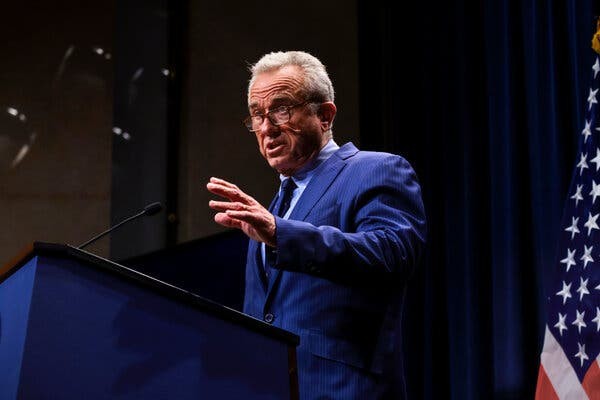Kennedy Claimed Autism ‘Destroys’ Lives. Autistic People Disagree.
People in the community called the remarks dehumanizing and warned they could perpetuate harmful stigma.
Robert F. Kennedy Jr.’s remarks in a news conference Wednesday have sparked an outraged reaction among many autistic people and their families. Credit...Pete Kiehart for The New York Times
By Maggie Astor, Azeen Ghorayshi and Dani Blum
April 18, 2025 – New York Times
Robert F. Kennedy Jr.’s remarks this week that autism “destroys” children have prompted outrage among many autistic people, who said they had done things Mr. Kennedy claimed were impossible, like hold a job, write a poem, play baseball and go on dates. They added that the lives of people who did need help performing daily activities were still worthy of respect.
“Autism doesn’t destroy families. It’s the ableism that does,” said Tyla Grant, who was diagnosed with autism at 17. She called Mr. Kennedy’s comments “fear-mongering” and said his “rhetoric flattens our existence into this outdated stereotype.”
Many parents of autistic children said they feared Mr. Kennedy’s remarks would set back efforts to destigmatize autism and connect families with support services.
“How will our children survive if they are considered a tragedy?” said Kim Cristo, whose 17-year-old daughter is “essentially nonverbal” but has a fulfilling social life, loves music and does yoga and karate. “How can we make their lives meaningful if they are being dismissed as lost causes?”
Mr. Kennedy made his remarks at a news conference on Wednesday discussing new data from the Centers for Disease Control and Prevention that showed autism diagnoses among children in the United States have continued to rise. Though the increase is largely thought to be driven by broadened criteria and increased awareness, Mr. Kennedy falsely declared that autism was preventable and called the situation an epidemic.
“These are kids who will never pay taxes,” he said, adding, “Many of them will never use a toilet unassisted.”
Ms. Grant, 27, said that Mr. Kennedy’s remarks “just bring to light what we all know, that we live in a world that still struggles to treat autistic people with basic decency — especially when we need support.”
Autism is a neurodevelopmental disorder that causes difficulties with social interaction and communication. Because it encompasses a broad array of traits that can vary in how much they affect a person’s life, it is often described as occurring on a spectrum.
Some autistic people need extensive support in everyday life. Many others live independently, with demanding jobs and active social lives. And many fall in between, having trouble navigating some tasks and interactions but managing well with accommodations.
Geoff Saavedra, 50, said he had benefited from having a mother who helped him find coping mechanisms to manage what he described as “violent meltdowns,” rather than treating him as a problem, as Mr. Kennedy’s comments implied he was.
“When I was a teenager, my mother tried to find ways to help me so I would not hurt anyone,” he said. “I learned to feel the meltdown coming on and then I would go into our backyard and chop wood.”
In a statement, an H.H.S. spokeswoman said that Mr. Kennedy’s statements were not intended to stigmatize autistic children or their families, but rather to emphasize the need for more research into “environmental factors contributing to the rise in autism diagnoses.” Mr. Kennedy, who has long pushed an unfounded link between autism and vaccines, said he would investigate the causes of autism and provide “some of the answers” by September.
“Secretary Kennedy remains committed to working toward a society where people with autism have access to meaningful opportunities, appropriate supports and the full respect and recognition they deserve,” the statement said.
Kara, an autistic woman who asked to be identified only by her first name because she feared harassment from co-workers who don’t know about her diagnosis, couldn’t speak in public until high school. As a child, she hid in boxes or behind furniture, and drank from a bottle until age 7 because she didn’t have sufficient motor skills to use cups.
But over time, she has learned coping skills. She follows strict routines and, with therapy, is able to work at a school. Phone calls are difficult, but she communicates by email.
“The child version of me who could not speak deserves a happy life just as much as anyone,” she said. She added that as a child, she was keenly aware of comments like Mr. Kennedy’s, even though she couldn’t verbalize a response. “‘Nonspeaking’ does not mean ‘non-listening,’” she said. “I was aware of the terrible things people were saying about me, when they discussed me like I wasn’t even there.”
Not all parents of autistic children were outraged by the comments. Jackie Ceonzo, whose son is nonverbal and has seizures, said she was glad that Mr. Kennedy was talking about the challenges people with higher support needs and their families faced. “We are in a crisis with an aging population of parents caring for an aging group of kids who will require lifelong care,” she said.
But several autistic adults with high support needs said that they were as upset by Mr. Kennedy’s remarks as anyone — and that, as children, they had been deeply hurt by their parents’ sense of them as a burden.
And Maria Davis-Pierre, a therapist in West Palm Beach, Fla., who counsels Black families of children with autism, said she feared that the remarks would prevent some of those families from seeking diagnoses for their children.
Continuing a trend first seen in 2020, the new C.D.C. data found higher rates of autism among Black, Hispanic and Asian American children than among white children, as clinicians, teachers and parents increasingly spot early signs in communities that were previously overlooked.
“When somebody is telling you that your child is never going to contribute and will destroy your family, that continues to harm our community,” said Ms. Davis-Pierre, who has two autistic children and was herself diagnosed with autism at age 37. “Which means they’re not going to get supports and services they need. In the Black community, autism is then seen as a behavioral issue that feeds the school-to-prison pipeline.”
Marianne Eloise, 32, was stunned by Mr. Kennedy’s remarks, especially his comment that autistic people would never write a poem. Ms. Eloise, who is autistic, is herself a published poet.
“I would love to read R.F.K.’s poetry, if he could share it,” she said. “I’m not familiar with his work.”
Maggie Astor covers the intersection of health and politics for The Times.
Azeen Ghorayshi covers the intersection of sex, gender and science for The Times.
Dani Blum is a health reporter for The Times.
Category:






